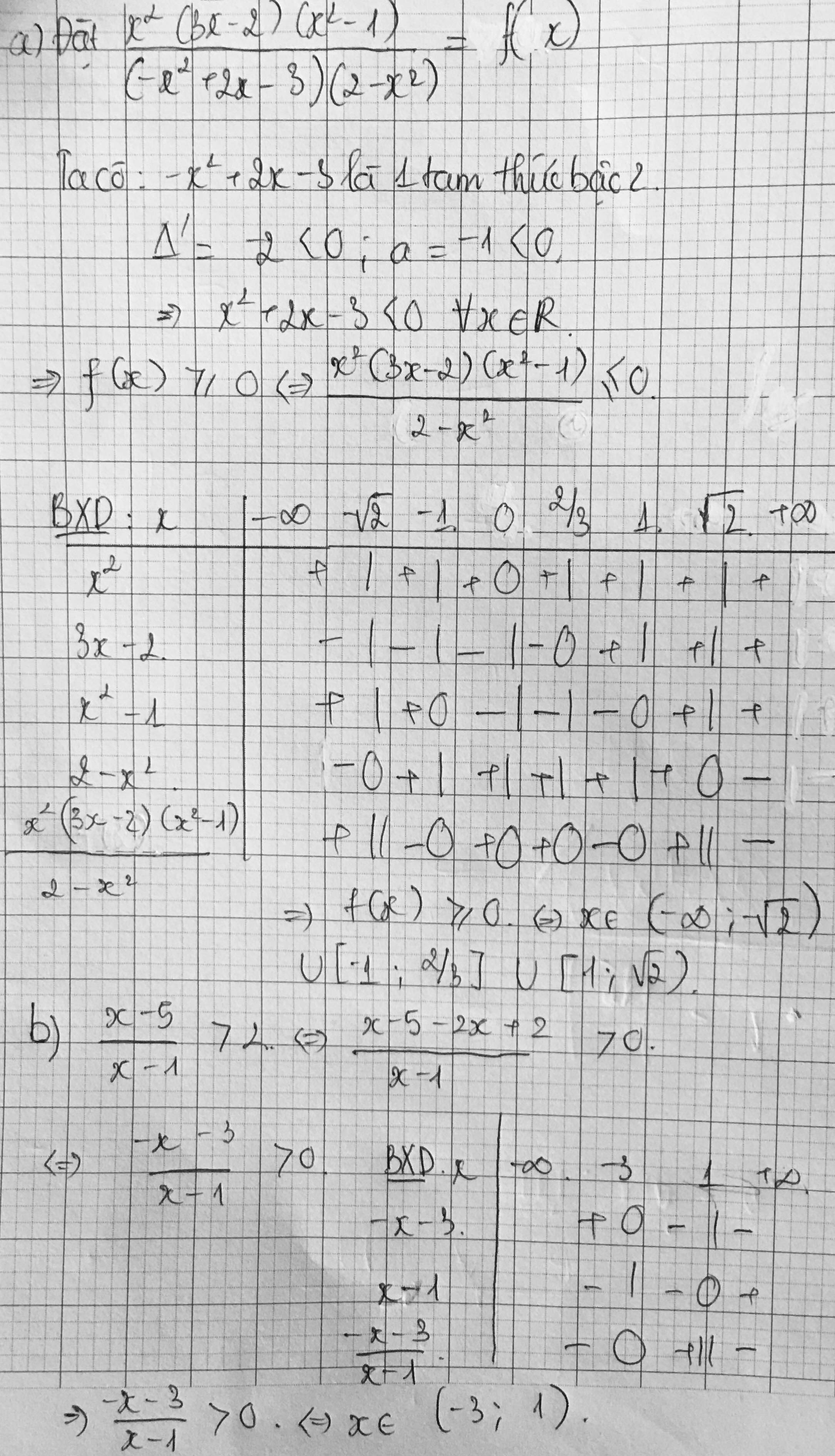3) \(\frac{x-2}{x-5}\) \(-\frac{5}{x^2-5x}=\frac{1}{x}\)
\(\Leftrightarrow\) \(\frac{x-2}{x-5}-\frac{5}{x.\left(x-5\right)}=\frac{1}{x}\)
\(\Leftrightarrow\frac{\left(x-2\right).\left(x+5\right)}{x.\left(x-5\right)}-\frac{5}{x.\left(x-5\right)}=\frac{1.\left(x+5\right)}{x.\left(x-5\right)}\)
\(\Leftrightarrow x^2+5x-2x-10-5=1x+5\)
\(\Leftrightarrow x^2+5x-2x-1x-10-5-5\) = 0
\(\Leftrightarrow\) \(x^2+2x-20=0\)
\(\Leftrightarrow x^2+2x-10x-20=0\)
\(\Leftrightarrow\) (x\(^2\) + 2x) - (10x + 20) = 0
\(\Leftrightarrow\) x.(x + 2) - 10.(x + 2) = 0
\(\Leftrightarrow\)
4) \(\frac{x-4}{x+7}-\frac{1}{x}=\frac{-7}{x^2+7x}\)
\(\Leftrightarrow\frac{x-4}{x+7}-\frac{1}{x}=\frac{-7}{x\left(x+7\right)}\)
\(\Leftrightarrow\frac{\left(x-4\right).\left(x+7\right)}{x.\left(x+7\right)}-\frac{1.\left(x+7\right)}{x.\left(x+7\right)}=\frac{-7}{x.\left(x+7\right)}\)
\(\Leftrightarrow\) \(x^2+7x-4x-28-x-7=-7\)
\(\Leftrightarrow x^2+7x-4x-x-28-7+7=0\)
\(\Leftrightarrow\) x\(^2\) + 2x - 28 = 0
\(\Leftrightarrow\) x\(^2\) + 2x - 14x - 28 = 0
\(\Leftrightarrow\) (x\(^2\) + 2x) - (14x + 28) = 0
\(\Leftrightarrow\) x.(x + 2) - 14.(x + 2) = 0
\(\Leftrightarrow\) (x - 14) = 0 hoặc (x + 2) = 0
\(\Leftrightarrow\) x = 4 (Nhận) hoặc x = -2 (Loại)
5) \(\frac{x+2}{x-2}+\frac{x-2}{x+2}=\frac{8x}{x^2-4}\)
\(\Leftrightarrow\) \(\frac{\left(x+2\right).\left(x+2\right)}{\left(x-2\right).\left(x+2\right)}+\frac{\left(x-2\right).\left(x-2\right)}{\left(x+2\right).\left(x-2\right)}=\frac{8x}{\left(x-2\right).\left(x+2\right)}\)
\(\Leftrightarrow x^2+2x+2x+4+x^2-2x-2x+4=8x\)
\(\Leftrightarrow\) \(x^2+x^2+2x+2x-2x-2x-8x+4+4=0\)
\(\Leftrightarrow2x^2-8x+8=0\)
\(\Leftrightarrow\) 2x\(^2\) - 2x - 8x + 8 = 0
\(\Leftrightarrow\) 2x(x - 1) - 8(x - 1) = 0
\(\Leftrightarrow\) 2x - 8 = 0 hoặc x - 1 = 0
\(\Leftrightarrow\) 2x = 8 hoặc x = 1
\(\Leftrightarrow\) x = 4 (Nhận) hoặc x = 1 (Nhận)
Vậy S = {4; 1}
6) \(\frac{x+1}{x-1}-\frac{x-1}{x+1}=\frac{4}{x^2-1}\)
\(\Leftrightarrow\) \(\frac{\left(x+1\right).\left(x+1\right)}{\left(x-1\right).\left(x+1\right)}-\frac{\left(x-1\right).\left(x-1\right)}{\left(x+1\right).\left(x-1\right)}=\frac{4}{\left(x-1\right).\left(x+1\right)}\)
\(\Leftrightarrow\) x\(^2\) + x + x + 1 - x\(^2\) + x + x - 1 = 4
\(\Leftrightarrow\) 4x - 4 = 0
\(\Leftrightarrow\) 4 (x - 1) =0
\(\Leftrightarrow\) x - 1 = 0 / 4 = 0
\(\Leftrightarrow\) x = 1 (Nhận)
Vậy S = {1}
7) \(\frac{x+1}{x-1}+\frac{-4x}{x^2-1}=\frac{x-1}{x+1}\)
\(\Leftrightarrow\) \(\frac{\left(x+1\right).\left(x+1\right)}{\left(x-1\right).\left(x+1\right)}+\frac{-4x}{\left(x-1\right).\left(x+1\right)}=\frac{\left(x-1\right).\left(x-1\right)}{\left(x+1\right).\left(x+1\right)}\)
\(\Leftrightarrow x^2+x+x+1-4x=x^2-x-x+1\)
\(\Leftrightarrow\) 0
Vậy S ={\(\varnothing\)}




+ Trong cách giải của bạn Sơn có ghi
\(\left(1\right)x^2-5x=5\left(x-5\right)\)⇔ là sai vì x = 5 không là nghiệm của (1) hay (1) có ĐKXĐ: x ≠ 5.
+ Trong cách giải của Hà có ghi:
\(\left(1\right)\Leftrightarrow\dfrac{x\left(x-5\right)}{x-5}=5\Leftrightarrow x=5\)
Sai ở chỗ không tìm ĐKXĐ của phương trình mà lại rút gọn x – 5.
Tóm lại cả hai cách giải đều sai ở chỗ không tìm ĐKXĐ khi giải phương trình chứa ẩn ở mẫu.